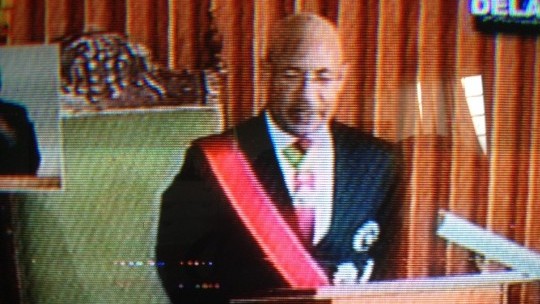Members of the Senate and the House of Representatives gathered for the ceremonial opening of Parliament with the usual pomp and pageantry on Thursday
Governor General Sir Patrick Allen presented the Throne Speech setting out the Government's agenda for the new legislative year, as well as the administration's plans for the fiscal year which begins on April 1.
Sir Patrick said the proceedings marked the earliest start of the Parliamentary Year and the presentation of the Budget.
The following is the full test of the Throne Speech
Honourable Members:
Our meeting today is historic. It marks the earliest start to our new parliamentary year and the presentation of the annual Budget. It is taking place well before the start of the new Financial Year in April. For the first time, the tabling of the Estimates of Expenditure will be accompanied by the Revenue Measures for the Budget.
This new, more efficient budget process reflects a strengthening of the partnership with the people and a greater maturity of our political and governance system. This truly represents a deepening of our democratic processes and our systems of accountability.
As the Government continues to pursue tough and necessary economic reforms, the Jamaican people have demonstrated admirable courage and understanding.
They have been true partners, as we strive to build an economy on a foundation of fiscal prudence and sustainable policies. The Government believes that, even as it stays the course, it is by strengthening this partnership that we will galvanise the energies of our people to successfully tackle the challenges, achieve sustained economic growth and expand the opportunities for our people.
We must always cherish hope, and never forget that our mission is to create a better life for all Jamaicans. Hope is that quality that will sustain us in the midst of the fire. It is hope that fuels the passion to achieve what is possible.
As Emily Dickinson said:
Hope is the thing with feathers
That perches in the soul
And sings the tune without the words
And never stops at all”.
Let that be said of us as a people.
The 2014/15 Financial Year was another challenging one forthe Jamaican people, but our resilience and steadfast determination helped us to weather the toughest storms. We ended the year with much to be proud of.
Inflation for the calendar year was 6.4%, down from 9.5% in 2013.
The Net International Reserves topped US$2 billion, representing 18 weeks of imported goods and services.
The Current Account Deficit, which stood at 15% in 2011, declined to 7.3% in 2014.
The Primary Surplus at the end of November stood at $54.4 Billion – 12.8% better than the $48.2 Billion projected.
The country passed six consecutive IMF quarterly tests and is well on the way to passing the seventh (7th).
Jamaica made a successful return to the international capital market, raising US$800 Million from an oversubscribed offer.
Foreign Direct Investments increased by 74% or $287 million between 2012/13 and 2013/14.
We improved our ranking on the Ease of Doing Business Index, moving from 85 to 58 of 189 countries. We also improved our rankings in global competitiveness, and were rated the ‘best country in the Caribbean’ for doing business.
In tourism, we achieved another milestone, last year, welcoming over 3.5 million visitors to the island. Provisional gross foreign
We improved our ranking on the Ease of Doing Business Index, moving from
85 to 58 of 189 countries.
Exchange earnings between January and December from this industry are in excess of US$2.2 Billion, representing a 5.8% increase over 2013.
Investments in the tourism sector have reached nearly J$35 Billion.
Major development and improvement works were carried out on the nation’s road network, bridges and other infrastructure.
The Linstead to Moneague section of the North/South leg of Highway 2000 was opened in time for Independence. Work continues on the other sections of this highway from Caymanas to Ocho Rios. This is Jamaica’s largest ever infrastructure development project, with an investment of US$730 Million funded by China Development Bank.
We are on track to complete this project by early 2016.
We must continue to be relentless in our determination to keep our people safe.
We ended the calendar year with a 17% reduction in all major categories of crime, including murder, rape and shooting. Police fatal shootings also declined by 54%. There were over 600 arrests for lotto scamming, under new legislation passed in this House in 2013. The fight against crime and violence is one that must involve all of us.
The partnership for development also includes the provision of shelter, particularly low income housing. At the end of 2014, the National Housing Trust (NHT) spent nearly $17 Billion of its projected $22 Billion budget on housing solutions, while Government’s low income Food for the Poor/PetroCaribe Housing Project, aimed at households at the bottom of the socioeconomic ladder, completed 1,827 (one thousand, eight hundred and twenty-seven) two-bedroom wooden units.
The Government is committed to strengthening the partnership, and ‘balancing the books while balancing peoples’ lives’.
Investments in the tourism sector have reached nearly J$35 Billion.
Significant strides also have been made in enhancing gender equality, the empowerment of women and press freedom.
Jamaica led the world with the most women managers at 59.3% and jumped eight (8) places and are ranked ninth (9th) of 180 countries for press freedom.
In the year ahead, the Government will continue to strengthen the partnership for development through a programme of inclusive growth and expanded opportunities.
Given the critical role of the mining and energy sectors to our economy, the agreement with UC RUSAL to restart Alpart is timely. Some work will start, in the first quarter of this year, while renovation and upgrading of Alpart’s port and rail system will take place in the second quarter. Full re-opening of the plant at Nain is slated for the second quarter of 2017.
Modernising infrastructure, including development of a ‘smart grid’, and regulating provisions for the treatment of renewable and alternate energy are important aspects of our energy programme in 2015/16. Power purchase agreements have been signed with the Jamaica Public Service Company (JPS) for 78 MW of renewable energy, and this investment will see Jamaica having the largest solar farm in the English-speaking Caribbean.
The agricultural sector remains an important plank in the Government’s economic architecture and the creation of agro parks is a crucial aspect of our development strategy. During 2015/16, additional agro park sites will be established in Western Jamaica and St. Mary.
The Sugar Transformation Programme, which is changing the quality of life of families, will provide an additional 397 housing solutions for families in Clarendon and St Thomas. These will be delivered in the 2015/16 financial year, along with 49 infra-structure projects in Clarendon, St Thomas, Trewlawny, St Catherine, St Elizabeth and Westmoreland.
Improving the quality of education and output from the systemwill include the establishment in 2015/16 of the Department of School Services (DSS). The DSS will coordinate activities and provide a stronger focus on school improvement and accountability.
The Government also will embark on a rationalisation programme of the early childhood sector converting under-resourced basic schools into infant departments of primary schools.
Too many of our children have been placed in harm’s way… In an effort to give them additional protection, significant reviews of the Child Care and Protection Act and the Adoption of Children Act have been completed.
The Green Paper for the National Youth Policy is completed and focuses on a joined up approach, placing youth at the centre of development.
The Land Administration and Management Programme (LAMP) will continue to help owners of land receive certificates of title.
Fifteen thousand land titles will be delivered to Jamaicans, as the Administration strives to achieve its objective of creating an ownership society.
It is unlikely our people will be able to respond to the challenges and take advantage of the opportunities if they are not in the best of health. Last year, nearly $700 Million was spent to refurbish 128 health centers, under the Primary Health Care Infrastructure Renewal Programme.
To provide increased health care access to under-served and rural communities, the Government will deploy mobile units offering general medicine, dental health and blood collection.
The Government is committed to ensuring that potable water is available, especially to those living in rural areas. A programme to improve water supply and pursue rural water development projects is underway. These efforts will continue with the rehabilitation of water tanks islandwide, upgrading of water supply systems, refurbishing of treatment plants, and the installation of domestic and commercial water meters.
Last year was a busy legislative year, and 2015/16 promises to be as active as the Government seeks to improve the justice system and protect all Jamaicans.
Among the significant pieces of legislation on the 2015/16
agenda are:
• The Administrator General’s (Amendment) Bill to address longstanding problems of administering multigenerational intestate estates. It will allow the
Administrator General to administer those estates where there are minor beneficiaries, without having to obtain a grant of letters of administration from the Court. This will make it much easier to pass on property to the established next of kin.
• The Sexual Harassment Act will provide legal protection for persons at the workplace and in other institutions. It will give recourse both to the Courts and to the Industrial Disputes Tribunal whose mandate and capacity will be expanded to deal with these claims, thereby providing effective redress for victims.
• The Cybercrimes (Amendment) Act to provide more robust tools to facilitate the investigation and prosecution of cybercrimes, and to bring the Act in line with international best practice.
The Government is committed to ensuring that potable water is available especially to those living in rural areas.
•The long-awaited Fishing Industry (Amendment) Act to facilitate better management of that industry.
• The Agricultural Commodities Regulatory Authority Act will create a body to replace the Coffee Industry Board, the Cocoa Industry Board and the Coconut Industry Board. This new regulatory body also will succeed the Export Division of the Ministry, in managing the nutmeg, ginger, turmeric and pimento sub-sector.
• The New Electricity Act now before the House will replace the existing 1890 statute. It will create a modern regulatory framework to provide more competition, and set a platform to encourage the high levels of investment that this critical pillar of the economy needs.
Efficiency in the operations of local authorities was enhanced last year, with the passage of the Municipalities (Validation and Amendment) Act. This legislation ensures that municipalities have effective political leadership and decision-making authority.
Legislation to enshrine Local Government in the Constitution also will be debated.
In addition, three strategic Bills to strengthen Local Government will come before Parliament. They are the Local Governance Act, the Local Government (Unified Service and Employment) Act, and the Local Government (Financing and Financial Management) Act.
Collectively, they reaffirm the Government's commitment to a modern system of Local Government to deepen our democracy and bring it closer to the people.
Also coming before Parliament this year are:
• The National Building Bill to provide a modern legal framework for the effective regulation and management of building works and building-related activities.
• Legislation to establish a National DNA Database, so critical to modern investigation of crime.
• Deliberations on the Evidence (Amendment) Bill which will remove some important procedural inefficiencies that create unnecessary delays in our justice system.
• The Caribbean Court of Justice (Constitution) (Amendment) Bill, the Caribbean Court of Justice (Original Jurisdiction) Bill, and the Judicature (Appellate Jurisdiction) (Amendment) Bill, which collectively give constitutional entrenchment to the Caribbean Court of Justice (CCJ) as the final court of appeal for Jamaica. The CCJ would replace the colonial Judicial
Committee of the Privy Council that sits in London, as the apex of our judicial system.
• The Criminal Justice Administration (Amendment) Bill will make provision for sentence reduction on guilty pleas, removing the existing disincentive to pleading guilty to offences which carry mandatory minimum sentences.
• The Jury (Amendment) Bill will bring important reforms to the jury system, which is presently beset with challenges that cause significant delays in the trials of serious criminal cases.
• The long-awaited Amendment to the Road Traffic Act, will significantly modernise the current legislation and give support higher levels of discipline and orderly behaviour on the nation’s roads.
The Joint Select Committee's review of the Integrity Commission Bill will be completed. This legislation will establish a single anti-corruption agency with investigatory, information-sharing and prosecutorial powers, while including important checks and balances to ensure procedural fairness for those under investigation.
The transformation of the Public Service is an essential part of the partnership for development.
Our Public Service has demonstrated real strength, over the years, in supporting the implementation of the policies of Government.
We thank all of our public sector workers for their sacrifice and their understanding during this period of wage restraint.
The present Heads of Agreement with our workers will come to an end on March 31, 2015. While the Government has already signalled its intention not to ask workers for another period of wage freeze, the Wage to GDP, as legislated, must be met by 2016/2017.
The Government is committed to honouring all outstanding
obligations that were agreed to with our public sector workers and, to this end:
• We will pay the annual performance increment of 2.5%.
• We will pay the third tranche of the Health Sector reclassification.
• We will honour the final one-off payment of $25,000 to each Public Sector Worker, arising from the 2012-2015
• We will honour the payment of all arrears to various public sector groups, from previous settlements such as our firefighters, education officers, correctional officers and medical officers.
One of the most remarkable things about this small country is our impact on the international community. We punch way above our weight, and our prowess -- while stamped so indelibly in the areas of sports, music and culture -- is also amply demonstrated in the field of international diplomacy and foreign affairs.
Among notable achievements, last year, our distinguished Jurist Patrick Robinson was elevated to be a Judge at the International Court of Justice. Indeed, we little but we Tallawah!
A proposal for erecting a permanent memorial to the victims of slavery and the transatlantic slave trade, first mooted by Jamaica and endorsed by CARICOM and the African Union, will be unveiled on the grounds of the United Nations headquarters in New York, next month.
The memorial pays tribute to the resilience and courage of the 17 million men, women and children sold into slavery, as Jamaica joins the world in marking the United Nations’ International Decade for People of African Descent, which began on January 1.
One of the most remarkable things about this small country is our impact on the international community.
This year also marks the 10th anniversary of the signing of the PetroCaribe Agreement with Venezuela and the 200th anniversary of the historic Jamaican Letter written from Kingston by that great liberator, Simon Bolivar. In celebrating the anniversary, Jamaica will host the PetroCaribe Council Meeting and open the Simon Bolivar Centre in Downtown Kingston.
In our recognition and support of the Diaspora’s role in the country’s development, the 6th biennial Jamaica Diaspora Conference will take place in Montego Bay in June 2015.
We are a people of destiny. We are a people on a special mission.
Many look to us as examples of resilience, courage and hope.
We cannot let them down, and we cannot let ourselves down.
Above all, we cannot let our children down.
Martin Luther King Jr. reminds us: “If you lose hope, somehow you lose the vitality that keeps life moving; you lose that courage to be, the quality that helps you to go on in spite of it all.”
As a nation and a people, we have our challenges, but as the Good Book says, “We are more than conquerors.” We must never lose sight of that.
The Government believes in partnership for development with inclusive growth and expanding opportunities, and the legislative agenda and the programmes of this 2015/16 Financial Year are intended to ensure that sustained and inclusive growth is achieved for the development of our people.
In this partnership, Jamaica will soar because we dream big, plan and execute well, and we hold steadfast to the hope of a brighter future for all.









 All feeds
All feeds







